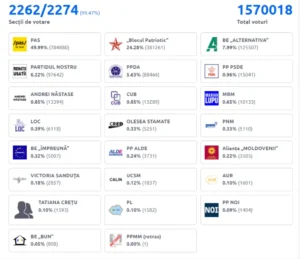
The Central Electoral Commission (CEC) of Moldova has all the necessary legislative powers to check, control and impose sanctions on violators. CEC Secretary Alexandru Berlinschi said that he hoped that there would be no contestants violating the electoral legislation, but if such violations were found, the commission would certainly apply sanctions. He stressed that one of the roles of the CEC is to monitor the financial reports that are mandatory for all election candidates, as part of their election campaigns.
All political parties registered as electoral candidates and independent candidates are required to periodically submit financial reports to the CEC. These reports will be checked by the commission in order to detect underestimation of expenses and to detect any actions that are not reflected in the reports. All financial reports are also published on the official website of the CEC and are available to the public.
As for sanctions, they are stipulated in the Electoral Code and are applied in stages, starting with warnings and financial sanctions and ending with exclusion from the electoral race. Alexander Berlinski also noted that in case of violation or imposition of financial sanctions, an election contestant may be denied public funding. However, the CEC hopes to avoid such situations and strives to ensure that all election candidates comply strictly with the Electoral Code. The Commission regularly conducts training seminars for party treasurers, who are responsible for the management of funds, and informs them about the need to comply with the legal framework. The course of the election campaign is expected to clarify how this strategy will be implemented.
The CEC secretary also emphasized that at the beginning of each election campaign, the commission invites representatives of electoral candidates to the CEC headquarters to sign a code of conduct and an agreement based on certain principles that must be respected during the campaign.
He stressed that the CEC has everything necessary to control the activities of all election candidates, even though their number is considerable (more than 55 thousand people). Since 2023 there are permanent territorial electoral bodies, which include chairmen of district electoral councils that are civil servants of the CEC. They have the ability to initiate administrative procedures in case of a case.
Thus, the CEC has all the tools to control the activities of electoral contestants, including financial reports and the application of sanctions under the Electoral Code.






